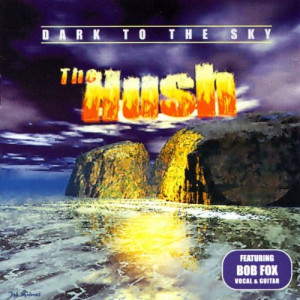 After many years on the folk music scene Bob Fox‘s status was boosted by his appearance as special guest on the Fairport Convention 2000 Winter Tour. Later that year he recorded an album with the band accompanying him, almost making it a Fairport album, with Fox as a replacement for Simon Nicol. This year he appeared at Cropredy, with his acoustic rendition of “Big River” being one of my personal highlights of that weekend.
After many years on the folk music scene Bob Fox‘s status was boosted by his appearance as special guest on the Fairport Convention 2000 Winter Tour. Later that year he recorded an album with the band accompanying him, almost making it a Fairport album, with Fox as a replacement for Simon Nicol. This year he appeared at Cropredy, with his acoustic rendition of “Big River” being one of my personal highlights of that weekend.
Last year Fox formed The Hush together with another veteran from the folk circuit, guitar player Jed Grimes, a survivor from The Hedgehog Pie, an early north England folk rock group. The Hush is a six piece outfit with Garry Linsley on saxophones, Graham Wood on assorted keyboards, Neil Harland on basses and Paul Smith on drums. The group is dedicated to playing music from northern England, both traditional songs and songs by the big northern songwriters like Tommy Armstrong and Johnny Handle. They aim for a soft, semi acoustic sound, more jazzy than rocky, a sound well suited to Fox’s voice. It is actually very difficult to imagine him backed by screaming guitars and heavy drums.
Although Dark to the Sky is the first release from The Hush, some of the songs will be familiar to folk addicts. “Byker Hill” is a bit different from the version made popular by Messiers Carthy and Swarbrick, including a biting electric guitar solo from Grimes. The Hush’s “The Snow It Melts the Soonest” (note the singular in the title, often the song is about the snows in plural) previously recorded by people like Pentangle and Dick Gaughan. And Tommy Armstrong’s “Oakey’s Strike Evictions” was once a diamond in the repertoire of Jack the Lad. Fox also digs into his old sins and brings us “The Bonny Gateshead Lass” once again. It is an amusing love song by Joe Wilson, with lines about the conversation between the two lovers to be that I assure you would not find in any other song! “She mentioned, confidentially, that her uncle was a grocer/and her mother’s father’s cousin was a fiddler on the shore.” The song gets a very jazzy treatment, with Smith playing with brushes and Linsley providing a saxophone solo.
In the north of England there are many songs about mining, something not quite unexpected considering the strong coal mining traditions there. The Hush gives us a fair share of these songs. In fact two of them are among the best tracks on the album. Johnny Handle wrote “Going to the Mine” in 1980, but it has a timeless feel to it. It is a slow song with a strong but simple melody line and lyrics about the feelings of a miner on his way to work, already longing for the weekend. “Flying birds have freedom/I must serve my time.” Fox and his friends do it full justice with a slow build up, including another saxophone solo and some lovely background guitar and piano work. My absolute favourite is another slow Handle song, “Guard Yer Man Weel,” sung in a strong northern accent. The song tells the wife of a miner to take good care of her husband when he is above ground, as accidents can so easily happen below. It somehow seems appropriate that the album title is taken from this song.
All in all Dark to the Sky is a good effort from a newly formed group. It may not grab you instantly, but slowly grow on you with repeated listenings. Sometimes the arrangements are a bit over-soft, but the highlights are far more common than the tracks that get programmed away.
My message to the band would be: Just do a few tours, trying out some more songs, and then go back to the studio and record a monster of an album, and see you next year in Cropredy I hope.
(MWM, 2002)
